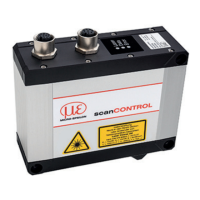Page 44
Operation of the Sensor with a PC
scanCONTROL 30xx
6.5 Error Influences
6.5.1 Reflection of the Target Surface
The sensor basically evaluates the diffuse portion of the laser line reflections. Any statement about a mini-mum reflection factor is only
possible with reservations.
A preliminary examination is necessary for using the sensor on transparent or reflecting objects.
The method of direct reflection on reflecting surfaces as it is successfully applied for the point triangulation cannot be used for the line
triangulation on account of the fan-shaped form of the laser line (central projection). Here, the receiving lens would only be able to
reach a narrow area near the center. As usually curved surfaces should also be measured for the profile measurement, this range will
be further narrowed.
6.5.2 Color Differences
Color differences of measurement objects have effects. However, these color differences are often also combined with different pen-
etration depths of the laser light into the material. Different penetration depths in turn result in apparent changes of the line thickness.
Therefore, color changes, combined with penetration depth changes, can result in inaccurate measurements.
As the exposure parameters can only be changed as a whole for one profile, careful matching of the expo-sure to the target surface is
recommended.
6.5.3 Temperature Influences
A running-in time of at least 20 minutes during start-up is required in order to achieve a uniform temperature spread in the sensor.
If measurements with accuracy in the µm range are made, the effect of temperature fluctuations on the mounting must also be ob-
served by the user.
Due to the damping effect of the thermal capacity of the sensor, fast temperature changes are only measured after a delay.

